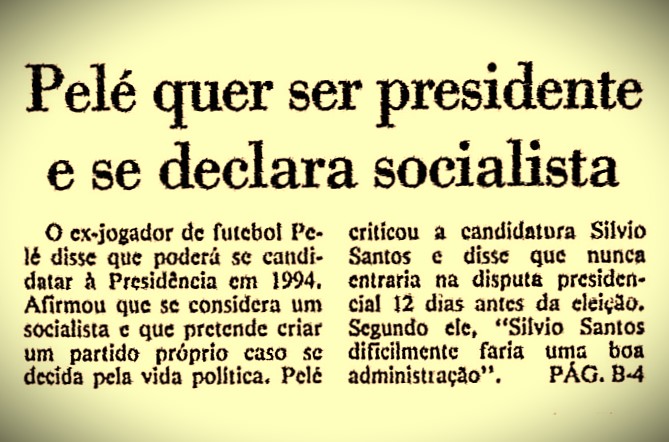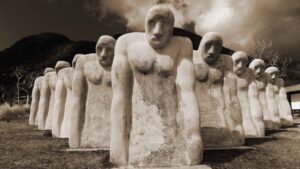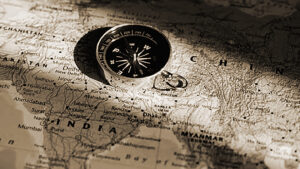
January 21, 2023: Pele versus Brazilian spies? Incredible as it may sound, the soccer magician, whose demise at the age of 82 last month plunged the world into mourning, was spied upon by Brazil’s intelligence agencies and was unsuspectingly investigated during the 1970s as part of the ruling junta’s efforts to weed out opponents and socialist sympathisers. This chapter in the football legend’s life is rarely highlighted in mainstream commentaries.
Edson Arantes do Nascimento – known to the world as Pele and originally nicknamed Dico by his family – led a life in which he received worldwide adoration for his on-field exploits as a forward; famously proclaimed being a socialist; drew brickbats for his closeness to the country’s military rulers; aspired to become Brazil’s president; and served as the country’s sports minister.
But perhaps the most intriguing episode of Pele’s life and times was when Brazilian spies clandestinely monitored his off-the-pitch moves – just like defenders would try to man-mark him on the football field.
Official documents released much later reportedly show that “The King” of football, as he was nicknamed by the press, was under the scanner of Brazilian officials during the 1970s when the South American nation was ruled by a military dictatorship.
Pele was instrumental in helping Brazil claim World Cup triumphs in 1958 and 1970, and also appeared in a couple of games in the 1962 title win. But despite his phenomenal contribution in taking Brazil to the top of world football, he was probed by the country’s military leaders after he reportedly received a manifest seeking his support in getting political prisoners released.
Documents published by the Sao Paulo state government reveal that besides Pele, popular singers, TV hosts, and authors were among thousands of individuals being tracked by Brazil’s intelligence officials during the repressive military rule from 1964 to 1985.
Nearly 500 people were reportedly killed, disappeared, exiled, or underwent torture besides losing their political rights during the dictatorship, which came down hard on Leftist activists and their suspected sympathisers.
The documents on Pele show that the officials closely followed his day-to-day activities and probed incidents involving him, such as attacks carried out on his residence in his hometown Santos. Every aspect of the football icon’s life was being closely tracked by undercover intelligence operatives, including all his financial dealings.
Pele is so far not known to have publicly spoken on the subject of being placed under surveillance by the Brazilian government. He died at a hospital in Sao Paulo on December 29, 2022 after a battle with colon cancer.
SOFT CORNER FOR POOR KIDS
Though he was criticised from time to time for his silence on major political and societal issues and his proximity towards the ruling military class, Pele had a soft corner for underprivileged children. He made it known in 1969 when he dedicated his historic 1,000th goal to Brazil’s poor children.
Pele’s 1,000th goal, which he netted for his club Santos against Vasco as a second-half penalty kick at the hallowed Maracana Stadium in Rio de Janeiro in front of a crowd of 80,000 spectators, itself carries an intriguing factoid. Vasco’s Argentine goalkeeper Edgardo Andrada, who couldn’t stop Pele’s shot from the spot, himself was later accused back in his home country for helping carry out assassinations on behalf of the Argentine military dictatorship.
Years later, in his official life story, Pele: The Autobiography, the soccer legend wrote at length about his stated position on the plight of the country’s poor children. “I think many people didn’t understand what I was trying to say [about poor children]. I received some criticism; people called me a demagogue. They thought I wasn’t being honest. But it didn’t bother me. I believe it’s important that people like me send messages about education. There won’t be a future if children aren’t educated,” he wrote.
However, in 1984, a year before the junta was ousted, Pele clearly appeared to have taken a stand in support of the Diretas Já campaign (the campaign asking for direct voting during the military dictatorship in Brazil), for holding elections for the post of president. Pele’s iconic photo, in which he’s seen sporting a Diretas Já shirt, was said to have been taken after initial resistance from the football player.
A SOCIALIST, AND A
PRESIDENTIAL HOPEFUL
Five years after that episode that saw him draw a considerable amount of criticism, Pele stunned Brazil and the world by declaring that he was a socialist. He even indicated that he might contest for the post of Brazil’s president. He aired his aspiration to start a political party in case he decided to run for the nation’s top office. The startling announcement came at a media conference where Pele was asked to comment on the impending presidential election.

He reiterated his presidential aspirations a couple of times in the following months. “My political career will begin in four years, but already I am feeling an itch and will be a candidate to succeed President [Fernando] Collor [de Mello],” he reportedly said in October 1990.
Pele eventually couldn’t find the back of the net when it came to his presidential aspirations. A few years later, he took up the job of Brazil’s sports minister, helming the ministry for more than three years.
A música sempre fez parte da minha vida. Não há nada como uma rodinha de violão para alegrar o dia.
— Pelé (@Pele) May 12, 2022
.
Music has always been part of my life. There’s nothing like a jam session to brighten the mood. pic.twitter.com/NLywjNdRez
Para nós, brasileiros, o café é uma bebida quase sagrada. Alguém aceita um cafézinho?
— Pelé (@Pele) October 17, 2022
.
For us Brazilians, coffee is an almost sacred drink. Does anyone want some cafézinho? pic.twitter.com/6GS5ctkSYc
Que nota você daria para este motorista?
— Pelé (@Pele) May 18, 2022
.
How would you rate this driver? pic.twitter.com/pxYTCQ7lzr
O pessoal ainda fala que na nossa época o futebol era mais fácil? Em 1958, não tínhamos videogame na hora da concentração. 😂
— Pelé (@Pele) March 12, 2021
//
Do people still say that football was easier in our time? In 1958, we didn't have cell phone games to play while waiting until the match starts. 😂 pic.twitter.com/AwGKaWXs7U
REPUBLISHING TERMS:
All rights to this content are reserved. If you want to republish this content in any form, in part or in full, please contact us at writetoempirediaries@gmail.com.








